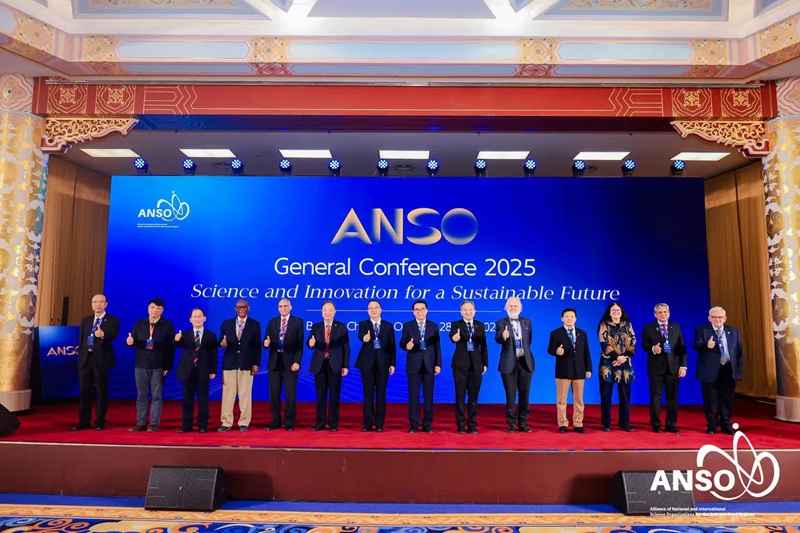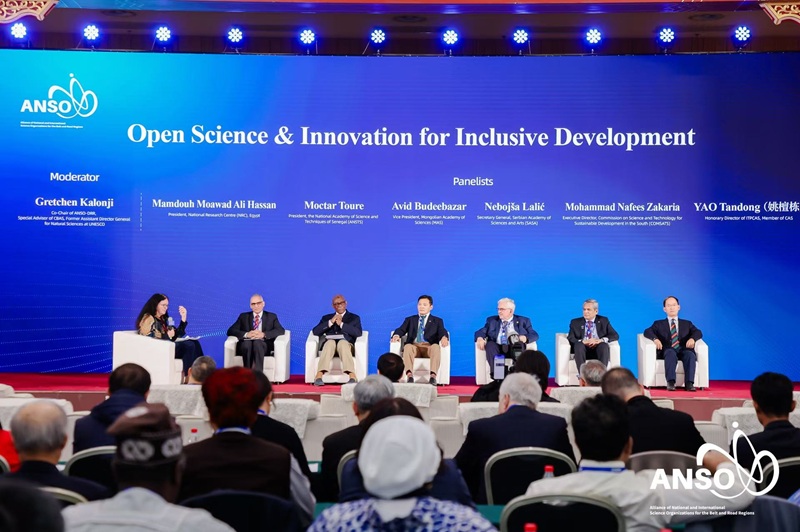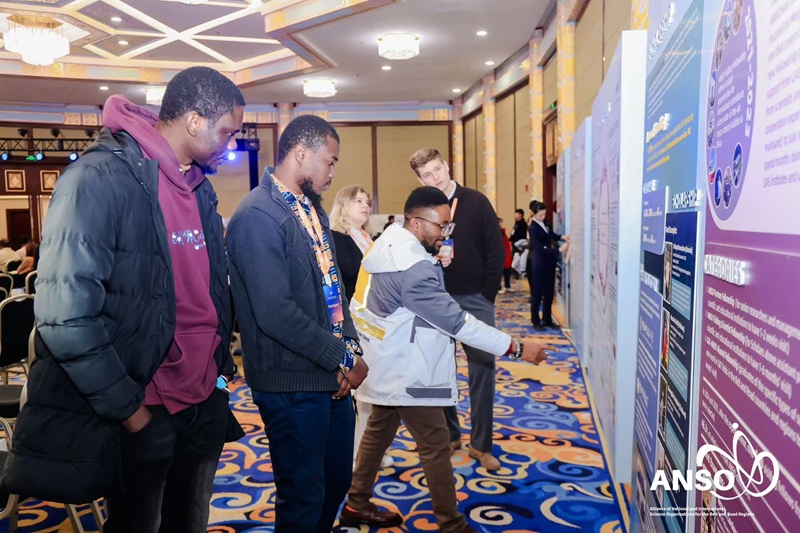The ANSO General Conference 2025 opened in Beijing on October 28. As a major concurrent event of the 4th ANSO General Assembly, the Conference, themed “Science & Innovation for a Sustainable Future,” brought together around 300 leading scientists, academic leaders, postdocs, post-graduate students and relevant stakeholders from over 50 countries and regions, along with delegates from more than 50 ANSO member organizations, including those representing 7 international organizations.

The Opening Ceremony was kicked off by opening remarks. Prof. Sukit Limpijumnong, President of ANSO, and President of the National Science and Technology Development Agency (NSTDA) of Thailand, pointed out that while UN Sustainable Development Goals (SDGs) require accelerated progress, occasional rifts in global scientific collaboration have slowed collective efforts—making dialogue and partnerships more essential than ever. He emphasized that “ We have been building an open, inclusive platform that unites expertise across nations—from supporting communities in developing clean water solutions to empowering farmers to strengthen food security—all to advance both global sustainability and the high-quality development of the Belt and Road Initiative.”
Prof. HE Hongping, Vice President of CAS and Vice President of ANSO, welcomed experts and scholars from around the world to China for the conference. He stated that “CAS will continue to provide overall support for ANSO's growth and development. We look forward to further strengthening our partnership and concrete collaborations with the other Members to achieve the objectives of ANSO in promoting global sustainability through science and technology innovation.”
Prof. Helena B. Nader, Vice President of ANSO and President of the Brazilian Academy of Sciences (ABC), delivered a video address. She noted that knowledge is the driving force of development. She added that in recent years, ANSO had already become a global platform connecting scientific development. She also highlighted that science should evolve alongside the humanities. While pursuing scientific and technological innovation, it remains essential to pay attention to humanistic and ethical concerns.
Prof. BAI Chunli, Founding President of ANSO, highlighted the need to make full use of this conference and other international platforms to explore complex global challenges in depth. He believed, “We need this and other important international conferences to discuss these complicated issues, to exchange insightful views and creative ideas, to sort out clear roadmaps and solutions, to steer and secure a safe, shared and sustainable future.”
Prof. Shahbaz Khan, Director of UNESCO’s Regional Office for East Asia, delivered a video address on behalf of UNESCO. He believed that science functions as a bridge for international exchange and drives global development. He reviewed the key contributions of UNESCO and ANSO in promoting sustainability through scientific progress. “UNESCO stands committed to develop collaboration with ANSO and other organizations which are well represented here today. At this conference, let us be affirmed of our shared commitment, to use science as a driver of progress and peace, to use innovation for efficiency and sustainability, and to use knowledge for our achievement, for our shared prosperity, and harmony between man and nature.”
Mr. MA Chengfang, Deputy District Mayor of Haidian District, People’s Government of Beijing Municipality, outlined Haidian District’s progress in international scientific and technological innovation, particularly in the integration of science, education and talent development. He noted that ANSO has made significant contributions to improving human livelihoods and addressing shared challenges, and expressed his hope that the event would help build a more dynamic global innovation network.
At the conference, Prof. Nils Christian Stenseth, ANSO Science Ambassador and President of the International Society of Zoological Sciences (ISZS), Prof. GUO Huadong, Director of the International Research Center of Big Data for Sustainable Development Goals (CBAS), and Prof. Gretchen Kalonji, Co-Chair of the ANSO International Network ANSO-DRR and former UNESCO Assistant Director-General for Natural Sciences, delivered keynote speeches and shared insights on how interdisciplinary collaboration and big data platforms can be leveraged to provide practical pathways for green transformation of BRI partner countries and across the globe.
Prof. Stenseth present on how climate change affects different regions around the world and revealed the mechanisms by which climate influences plague outbreaks, calling on scientists to join forces in addressing climate challenges. Prof. GUO Huadong pointed out that the current period is crucial for advancing the United Nations Sustainable Development Goals (SDGs), and highlighted China’s efforts in this regard, including the establishment of an International Research Center of Big Data for Sustainable Development Goals (CBAS). Finally, Prof. Kalonji focused on identifying key challenges and lessons from existing partnerships, exploring ways to better integrate research, education, and service at universities and research institutes, and seeking coordinated, joint efforts across networks to advance science for sustainable development.
The panel discussion focused on the theme “Open Science & Innovation for Inclusive Development.” Representatives from ANSO Governing Board member institutions, including the National Research Centre (NRC) of Egypt, National Academy of Sciences and Techniques of Senegal (ANSTS), Mongolian Academy of Sciences (MAS), Serbian Academy of Sciences and Arts (SASA), Commission on Science and Technology for Sustainable Development in the South (COMSATS), and the Institute of Tibetan Plateau Research, CAS, joined the discussion as panelists. They shared their institutional experiences and offered insights and recommendations on fostering joint progress in science, technology, and innovation.

As a major event in ANSO’s 2025 calendar, the two-day conference featured three thematic sessions on “Science & Technology for Sustainable Development,” “AI Development and Governance,” and “Capacity Building in STEM and Higher Education Cooperation”. respectively. The sessions featured discussions on topics of broad public interest, including how open science and open innovation can promote inclusive development and serve sustainable development, how AI can enhance public well-being, and how youth can act as bridges toward a shared future. With the support of ANSO, leading scientists from China and abroad jointly launched the International Research Network on AI Development and Governance during the conference.
At the Closing Ceremony on the afternoon of October 29, Prof. Deepak Aryal, Vice President of Tribhuvan University (TU), Prof. ZENG Yi, Professor at the Institute of Automation, CAS, and Prof. Zhou Congzhao, Vice President of the University of Science and Technology of China (USTC), presented brief summary report on behalf of the thematic sessions. They all emphasized that international scientific and technological cooperation is essential for addressing global challenges and building a sustainable future. They further expressed the hope that more efforts should be made to cultivate young talent, thereby facilitating the transfer and application of research outcomes.
Prof. Limpijumnong expressed his gratitude for the support of CAS and the Haidian District Government, as well as for the contributions of the organizing committee. He expressed his hope that young professionals in science and technology will further cooperate and make joint progress to advance the UN SDGs. Therefore, we can leverage scientific and technological achievements to enhance public well-being and jointly promote the high-quality development of the Belt and Road Initiative. “We dug into the core of our shared challenges: from aligning science and technology with the UN Sustainable Development Goals, to mapping responsible paths for AI governance, and to boosting STEM capacity through cross-border academic partnerships,” he said.
In his concluding remarks, Prof. HE Hongping stated that the event provided guidance for addressing the challenges of our time. He noted, “We’ve carried out discussions from strengthening interdisciplinary research to solve practical problems, to enhancing cooperation on the governance of emerging technologies such as artificial intelligence, and to advancing science and innovation for a sustainable future through capacity building and talent development. Together, these discussions have significantly deepened our insights into sustainable development.”

The event drew wide attention, accompanied by extensive media coverage. It helped lay a strong foundation for deeper multilateral partnerships and the expansion of a pragmatic and effective global network for scientific cooperation and innovation.